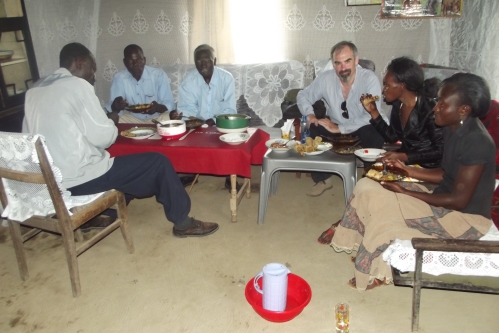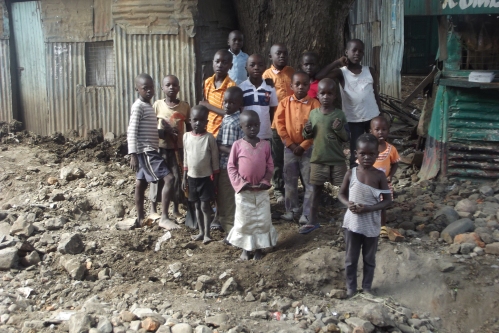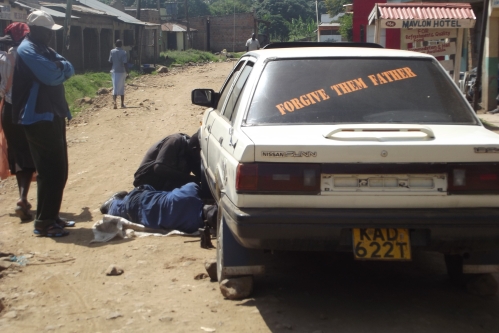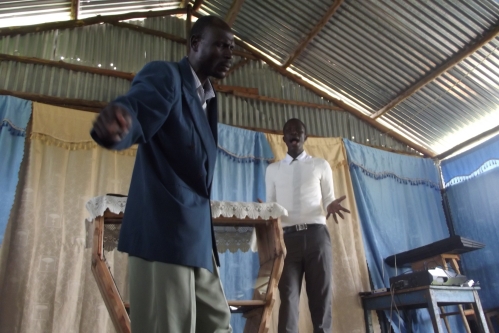Somewhat in contrast with my recent Kenya experiences –– but yet in a way in complete harmony with them –– this past week I allowed myself what for me is a major luxury expenditure; but one I can also write off as an important investment in my relationship with my younger son: I bought tickets for he and I to go to a concert by one of the great music icons of my generation: Stevie Wonder. Some would say it just goes with my ethnically Dutch heritage that I felt a certain pain in paying as much as I did for these tickets… just to be allowed to stand out under the afternoon sun on a dusty gravel sporting grounds, crowded together with a sweaty mob of mostly drunk people, to listen to music I’d actually heard hundreds of times before… but I still believe it was a necessary expenditure, and in the end well worth it.
 While I was off on my most recent African adventure I had missed my son’s birthday, as well as the celebration after he completed his required military service, so I felt I owed it to him to do something particularly special together this week. But in all honesty once again the present that I bought for him (like so many of his birthday toys from previous years) was something I probably bought at least as much for my enjoyment than for his. As a strongly professing fan of Motown music in general, and Stevie Wonder tunes in particular, I couldn’t really pass up the opportunity to witness his performance live. OK, so the promoter’s arrangements left something to be desired. It was still an experience that will rank among the most important lifetime memories I will share with my son. It was also a rather spiritual experience for me.
While I was off on my most recent African adventure I had missed my son’s birthday, as well as the celebration after he completed his required military service, so I felt I owed it to him to do something particularly special together this week. But in all honesty once again the present that I bought for him (like so many of his birthday toys from previous years) was something I probably bought at least as much for my enjoyment than for his. As a strongly professing fan of Motown music in general, and Stevie Wonder tunes in particular, I couldn’t really pass up the opportunity to witness his performance live. OK, so the promoter’s arrangements left something to be desired. It was still an experience that will rank among the most important lifetime memories I will share with my son. It was also a rather spiritual experience for me.
I actually got confused as to which Helsinki park the concert was in, somehow convincing myself that it would be in the grassier and shadier of the two where concerts are regularly held. With the more idyllic venue in mind I packed a small picnic for us and tossed that into a bag together with my digital camera of course, only to face significant disappointment when we arrived at the actual gate of the venue. As I said, the concert site was actually a city sandlot on which kids’ soccer and baseball tournaments are held fairly regularly. There was no place to comfortably spread the picnic blanket and they had a policy of not allowing in any full sized cameras. (Hundreds of people were shooting video with their cell phones with seemingly nothing the promoters could do about it, but that was beside the point: Cameras like mine were not permitted.) So I was told I’d have to leave my belongings at the baggage check point they had set up outside the gate.
This gave rise to another minor problem in that I didn’t bring any cash with me to pay the fee for such an additional service, but in the end that problem was rather pleasantly worked out. As the first opening act took the stage my son and I just sat down on a grassy knoll just outside the concert venue and enjoyed our little picnic together. It was just as the second act was coming on that I went to check my bag. It was a slow moment for those working at the baggage check area and so when I explained my dilemma to one of the attendants there, Hannu, had a bit of spare time to negotiate with me. In the end he was willing to take 10 minutes of interesting conversation as “payment in kind” for keeping an eye on my bag for the rest of the show. He had noticed that I was carrying the printout of my on-line concert ticket tucked into a small paperback history of Kenya, and he was interested in hearing the whole background story about my trip, and how I also considered Stevie to be a positive role model in promoting justice and compassion for the poor of Africa.
 Hannu was further interested in hearing about my work as a religious education teacher and why I consider such work to also be important, but we didn’t explore that avenue of conversation too far. After the fact I had somewhat of a feeling that perhaps I should have. Many of my evangelical friends might fault me for missing a golden opportunity to steer the conversation around in the sort of way that I could have “led him to the lord”. Instead I merely answered his question about why such lessons are important by saying that it is important for children in this country to have a functional understanding of what different sorts of people believe in religious terms, and how all that relates to their own (official, nominal) beliefs and let it go at that. He proceeded to tell me how cool it had been a few hours earlier to listen to Stevie and his band play “Yesterday” and some other Beatles cover material in their sound check, and to talk about his own perspectives on the value of intercultural experiences.
Hannu was further interested in hearing about my work as a religious education teacher and why I consider such work to also be important, but we didn’t explore that avenue of conversation too far. After the fact I had somewhat of a feeling that perhaps I should have. Many of my evangelical friends might fault me for missing a golden opportunity to steer the conversation around in the sort of way that I could have “led him to the lord”. Instead I merely answered his question about why such lessons are important by saying that it is important for children in this country to have a functional understanding of what different sorts of people believe in religious terms, and how all that relates to their own (official, nominal) beliefs and let it go at that. He proceeded to tell me how cool it had been a few hours earlier to listen to Stevie and his band play “Yesterday” and some other Beatles cover material in their sound check, and to talk about his own perspectives on the value of intercultural experiences.
That level of conversation actually gelled better with the rest of my summer’s spiritual experiences thus far –– including the Kenya trip as a whole, the background factors that led to me taking such a trip, and the significance of Stevie Wonder’s life and music for me as a person in relation to that context –– than an attempt at “personal evangelism” would have. That subject in turn is actually worth meditating on a bit here, so let me take some time to explain (to you and to myself) what I mean by that.
It was actually by way of former student of mine, Sandhja, who also happens to be an exceptionally talented singer and performer, that I first met the people from Bondoaid, whose work in Kenya I’ve taken the active interest in. The core group of active members in this organization are evangelical Christians of one stripe or another –– ranging from the Pentecostal to the more radical Baptist to the mainstream denominational Protestant branches of that spectrum. Sandhja is none of the above. Having been her religious education instructor throughout her teenage years I know something about her personal religious perspectives and how pressure to adjust them might feel to her.
 I know her to be highly sensitive in the most beautiful sense, and deeply interested in the sort of spirituality that goes with caring for others on many different levels; but prone to see that spirituality in part through the lens of her mother’s Hindu background and in part through a general secular humanist perspective. She was willing to give of her time and money to help Kenyan orphans, not because she saw it as a means of bringing them into some particular faith, but because she is genuinely prone to caring for others wants to help reduce human suffering when it is in her power to do so. That’s just the sort of person she is, and over the years she has consistently impressed me with her emotional depth in such matters. It was part of my job to make sure she understands the most basic concepts of what it means to be a Christian, and how that compares with other spiritual paths, including her own. It was never part of my job to try to convert her to my own way of thinking on such matters though, nor was it ever my inclination to try to do so. As I see it her life provides a closer reflection of the teachings of Jesus than most professing Christians that I know, so I’m not about to condemn her to hell for putting the wrong label on it.
I know her to be highly sensitive in the most beautiful sense, and deeply interested in the sort of spirituality that goes with caring for others on many different levels; but prone to see that spirituality in part through the lens of her mother’s Hindu background and in part through a general secular humanist perspective. She was willing to give of her time and money to help Kenyan orphans, not because she saw it as a means of bringing them into some particular faith, but because she is genuinely prone to caring for others wants to help reduce human suffering when it is in her power to do so. That’s just the sort of person she is, and over the years she has consistently impressed me with her emotional depth in such matters. It was part of my job to make sure she understands the most basic concepts of what it means to be a Christian, and how that compares with other spiritual paths, including her own. It was never part of my job to try to convert her to my own way of thinking on such matters though, nor was it ever my inclination to try to do so. As I see it her life provides a closer reflection of the teachings of Jesus than most professing Christians that I know, so I’m not about to condemn her to hell for putting the wrong label on it.
But it’s not my job to decide her eternal destiny anyway. It’s ultimately up to a source of justice way beyond what I can access or administer to do the final evaluation Sandhja’s life. So when it comes to that call, I’m happy to treat it the same as I did the predictions I was asked for regard World Cup Soccer this summer: Here’s how it looks to me, but it’s beyond my expertise to say anything for sure in advance, so I’m ready just to step aside and watch and see what happens. Meanwhile I have my own job to do –– what I believe God requires of me as a believer –– which is to “pay forward” the blessings I’ve received, in particular towards the poor, the outcasts, the prisoners and other disadvantaged people.
I happened to bump into Sandhja last week at a beachfront coffee shop, and we ended up sitting together for a bit discussing my trip, the Kenya project in general and the values behind it. She basically said that in her experience the evangelical Christians she had been working with on the project are truly warm and wonderful people, but there has been a continuous underlying tension over their expectations that at some point she would also become a “born-again Christian”. I could relate to what she was talking about not only from knowing the “born-again mind” intimately from the inside, but also from the similarities between what she was talking about and my experiences among the Cape Malay Muslims of South Africa during the year I spent there. Those folks too were generally very warm and hospitable, and accepting of my religious and cultural difference as a matter of respect for the most part; but not far below the surface was something between a hope and an expectation that someday, if I was honest enough and “my heart was open enough,” I would let go of my preconceptions about my own heritage and religiously become one of them. That wasn’t about to happen though, and from where I sat it wasn’t a matter of my having an insufficiently open heart or mind.
So Sandhja’s awkward situation was more than familiar to me. I couldn’t really apologize for the others’ expectations, but I could well appreciate the difficulties involved for her. I know how deeply ingrained the urge to win converts is in such circles, and how, for them, pursuing the objective of converting as many others as possible is considered to be the most virtuous behavior any person can possibly take part in. I know how thoroughly many have convinced themselves that the best way for them to truly love others is to coerce conversions and extract confessions of faith out of them by any means possible. I also know how –– even if one accepts such a premise regarding “the need to evangelize” –– the most sincere efforts to reach out to help others (both materially and spiritually) can easily morph into systems by means of which to gain and maintain abusive control over those being “helped”. I have seen many times how there is actually no form of religion –– or secular ideology for that matter –– which is completely immune to being corrupted by the thrill of having power over the beliefs of others, and that when it comes right down to it Evangelical Christians are probably the worst by this disease (with Muslims coming in a close second). So I’m pretty sure that those with a powerful urge to “lead this girl to the Lord” were quite blind to their own motivations in wanting to do so. So in the end Sandhja and I agreed that it’s not always easy but we do what we can to overlook other people’s cultural blind spots in the process of attempting to do good together with them.
And that brings me back to the Stevie Wonder show. When it was finally his turn Stevie came out onto stage to the tune of one of the few songs in the set which were not of his own composition: “How Sweet It Is (To be Loved by You)”. This provided a glorious opportunity for an audience sing-along right from the start, and Stevie was continuously working us throughout the show to try to turn us into a sweeter sounding choir –– including drilling us on the harmony parts to be sung. But more to the point, after the third chorus and some harmony suggestions on this number, Stevie offered a bit of explanation for its choice as the opener: for him it also contains an element of prayer. He’s not on the road this time promoting a new album or anything like that; he’s just out thankfully enjoying the experience of doing the work he loves and feeling the love of the international audiences in the process. And as part and parcel of that motivation he wanted to publicly thank God for the opportunities he has had in life and career, and to encourage others to join him in appreciating God’s great love.
 The appreciation for this perspective seemed to be somewhat limited among those in the highly secularized and fairly drunk Finnish audience, but Stevie didn’t let that discourage him. He qualified it right away by saying that he wasn’t promoting any particular religion. Like Pope Francis, Stevie is perfectly fine with people of good will being of other religions, or even being atheists. But still he wanted to stress the message that there is something greater than all of us to which we owe a certain awe, respect and thankfulness, and on the basis of which we need to learn to love each other. From there this implicit prayer of thanksgiving was a running theme throughout the rest of the show.
The appreciation for this perspective seemed to be somewhat limited among those in the highly secularized and fairly drunk Finnish audience, but Stevie didn’t let that discourage him. He qualified it right away by saying that he wasn’t promoting any particular religion. Like Pope Francis, Stevie is perfectly fine with people of good will being of other religions, or even being atheists. But still he wanted to stress the message that there is something greater than all of us to which we owe a certain awe, respect and thankfulness, and on the basis of which we need to learn to love each other. From there this implicit prayer of thanksgiving was a running theme throughout the rest of the show.
The one classic song of his included in the show that seemed to least harmonize with this principle of respect for the divine and loving each other on that basis, was “Part-Time Lover,” a tale of appreciation for a forbidden and conflict-laden relationship. His way of setting up that number with the audience had its own interesting humor to it. He asked the audience, “How many of you are in love?” A moderate number of hands showed murmured positive responses arose. “How many of you are in love with just one person?” Some giggles, but otherwise pretty close to the same level of response as for the previous question. “OK, now be honest: How many of you guys would really like to be in love with more than one lady?” While the audience was still chewing on that one the band started playing the intro. After the first verse then Stevie gave the audience their harmony parts for the song: guys scatting “bum, bum, badada-bum…” and women singing, “no, no, no, no, no…” Overall Stevie gave the impression that the experience this song talks about were as distant from his personal experiences as the unspoken eye-contact of unrequited love that he sings about in “My Cherie Amour”.
When it came to a song being intensely personal for him and intimately tied to his own life experience, on the other hand, the high water mark came with “Isn’t She Lovely,” which he wrote for his newborn daughter back in the seventies. She has since made a grandfather out of him and she was on the road with him as one of his backup singers –– the tall one on the far right. Savoring, appreciating and thanking God for that sort of love is where Stevie was clearly most in his element.
After that the next priority in his message to the audience was to pray and work together to eliminate the sort of suffering and social injustice described in the most pessimistic song in the set: “Living for the City”. How much more specific than that does the “gospel” message need to be in a pop concert? How much more specific than that can it be without the added detail getting in the way of the core message of peace and love?
If I were to analyze Stevie’s perspective on organized religion further I would have to turn to a song not included in his recent concerts, from his 1985 “In Square Circle” album: “Spiritual Walkers”. It is a somewhat cryptic musical comment on evangelical practices in general, and perhaps on Stevie’s fellow Motown veteran Michael Jackson’s propensity at the time to keep promoting his Jehovah’s Witnesses’ belief:
They knock on your door
You laugh in their face…
Walking places they should not be
But they will walk their lives
With a never ending light
They will walk their lives
’til they shine the light
Of truth into your life…
You run from their sight
Not to hear the holy word…
They have no defense
Except inner sense
And knowing the Almighty Friend
Stevie doesn’t actually come out for or against such people; he merely respectfully reports on what he “sees” and rhetorically asks others what they think.
In terms of his own core message though, Stevie remains focused on things that should be central concerns to people of faith, but which too many conspicuously religious folks remain silent about: fighting against such tragic injustices as racism, extreme poverty, various forms of segregation, handgun violence and “stand your ground laws”. Promoting particular religious dogmas just isn’t his thing. Nor is lecturing on ethics for that matter. He didn’t come to Helsinki to preach morality; he came to help people to feel good by getting them to sing along and share the love. If anyone else is interested in spreading the love in the same sorts of ways Stevie seems perfectly happy to have them on his side, regardless of their religious perspectives.
The only way I can remotely compare myself with Stevie is in saying that he and I are very much on the same page when it comes to understanding that the basic point of religion, when it’s done right, is building a genuine capacity for love and caring about others. As I said, he and I are on the same page with that one, though Stevie’s been reading from that page a lot longer than I have. I don’t have his same creative genius as a means of sharing that message with others, so I have to rely on being able to get just a bit closer to those in serious need than he can. At the same time I need to follow his example in limiting myself a bit in picking the causes I fight for carefully and sticking with the ones I choose.
No, I don’t think that religion can or should be reduced to nothing more than neutral “warm and fuzzy feelings” between “people of good will.” There really has to be something bigger “out there” to hold the whole system together for any religious teaching to have distinct value as such. My point here isn’t to redefine or defend my beliefs in ways that disregard the transcendent. My point –– and Stevie Wonder’s point as well, I believe –– is that what God has called each of us to do is to express the sort of love and mercy that he has given to each of us in turn to each other; not to bring everyone under the control of our favored style of religious system or to attempt to become the instruments of God’s vengeance and judgment upon the earth, the way so many religious folks seem to be longing to try their hand at. If we can remember what our basic task before God is in this regard, and if we can stick to working on that task rather than letting ourselves get distracted with religious power struggles, that is how I believe we can really bring the greatest glory and honor to God –– far more than by amassing huge numbers of new members or suitably preparing ourselves for an extended siege leading up to the battle of Armageddon.
Daring to care for others is the truest expression of true faith. Thus I would far rather work together with those with whom I have major philosophical and theological disagreements in the process of caring for those whom I believe God has instructed us to care for than to casually sit and endlessly discuss theories of the Second Coming with those who happen to theoretically agree with me on the mechanics of the redemption available in Christ. Furthermore, I honestly believe that those who genuinely care for others who are made in God’s image will stand in better stead before divine judgment than those who expect to pass through on the basis of having said the right evangelical magic words and participated in the proper rituals. But again, speculating over who God will judge how harshly, and on what basis, is really not our job as believers.
So regardless of how similar to or different from my own Stevie’s and Sandhja’s spiritual perspectives happen to be, I draw strength from the aesthetic satisfaction I get from their performances and I join together with them in doing what all believers properly should be doing: spreading the love, increasing the peace and treating the world around us (and all the people I share it with) with respect. Feel free to join us if in that effort if you’re so inclined.











